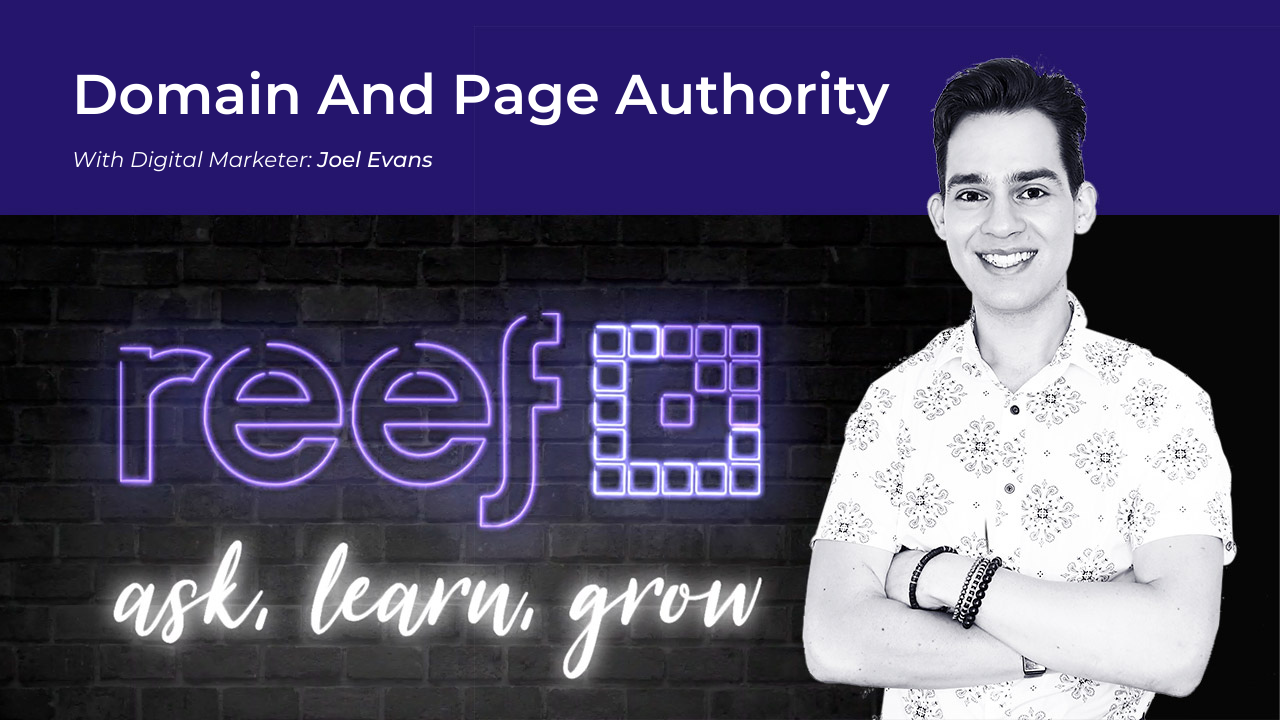Transcript
Hi everyone, and welcome to another episode of Ask, Learn, Grow, the show where the Reef team answer questions and share updates and insights from the digital marketing industry.
I’m joined today with Digital Marketer, Joel Evans, and we’re going to be talking about domain and page authority.
You may have heard these metrics discussed within the context of SEO, and whether or not they have an effect on the success of your SEO efforts.
What we’re going to do, is look at each one of these metrics in turn – domain authority and page authority – and then finish off with the most important thing, which is why it’s beneficial to have an understanding of these metrics and how to correctly interpret and use them.
Cool, so should we start with domain authority?
Joel Evans: Yeah.
The best way to understand domain authority is that it is a score given to your website
Not a score given officially by search engines, although they may well use it or something similar, but an accepted industry metric, calculated and reported by all the main SEO software platforms.
What that score means is how authoritative your website is compared to other websites on the internet.
Now the best way to understand domain authority is through a very useful metaphor – we’ll use real estate.
Imagine property value. The domain authority is Google’s understanding of your overall website’s value just like the value of a house. Page authority, on the other hand, imagine that this is a value given to different rooms within the house.
Page authority is the authority rating given to your individual page, comparatively to the overall website.
Usually you won’t have a page authority that is higher than the overall domain authority, but stranger things have happened in the SEO world!
You will have different levels of authority across different pages. Pages that have been a focus of SEO activity (or naturally performed better), tend to be better optimised and with a greater number of links pointing towards them, both internally and from other websites.
Pages structurally located closer to the home page can also inherit greater page authority.
These factors come into play when it comes to page authority. That’s how your page authority relates to your domain authority and the difference between them.
Scott: What do you use to measure domain authority and page authority?
Joel Evans: There’s a lot of useful tools out there that you can use. You can use Moz. That’s a popular one. You can also use Ahrefs. Really, any SEO tool on the market. Nowadays, they generally come with a domain and page authority measurement feature.
In the context of SEO, why do these things matter? Can we link domain and page authority to SEO success?
Joel Evans: We’ll start with page authority.
Page authority matters because it relates to the success of the individual page. Your homepage will traditionally have the most authority on your website comparatively to your other landing pages.
The reason why page authority matters for SEO is because it is a reading of the strength of that page in search.
If you want to grow your page authority for a particular page, you will want to be increasing the number of links pointing to that page from other pages on your website and from external domains.
You will want to make sure that the page is optimised with the right content, the right header tag structure and the right keywords to be an authoritative piece of content on that topic, whatever the topic of the landing page or blog post is (because blog posts function essentially the same when it comes to page authority).
Domain authority on the other hand, now this is more important and where you really get strategic with your SEO
You will improve the domain authority by working on different sections of the website overall to contribute to the whole, if that makes sense.
You might work on this landing page over here. You want to boost that page’s visibility (and authority).
You might work on this other landing page over here. You want to boost that landing page’s visibility (and authority).
By working on individual sections of the website, you improve the overall domain authority (and visibility) of the site as a whole.
Scott: What are the benefits of having a strong domain authority?
“The benefits of having a strong domain authority is that it improves the likelihood that you will rank in search for much more competitive keywords.”
When the search engines have to determine which website is the most authoritative source of information and the most credible source, they may look at domain authority (or its equivalent as used by the search engines) as one of the key ranking factors.
Is this a website that is authoritative enough for users to get a valuable experience for this search query?
Page authority will play into that a little bit, but if the domain authority is high enough, then sometimes page authority can be overlooked.
Scott: Generally speaking, if you’ve got a solid SEO strategy that incorporates working on pages strategically… that’s going to improve the page authority of whatever you’re working on, plus the domain authority of the site as a whole.
If you have a strong domain authority, the SEO benefits that accompany that, generally speaking, are that you can compete at a high level for more competitive, high traffic keywords.
Also for the lower competition keywords, or newer pages that you create, it’s potentially easier to compete for those.
Joel Evans: Exactly. Exactly. If you’re doing SEO properly, you won’t necessarily need to have a strategy to go after high domain authority, or to go after high page authority.
It’ll be acquired naturally as you optimise your content; as you work to acquire links back to that content and as you sculpt the authority of the website internally by adding the right internal linking structure.
If you’re SEO is in order, this will all come naturally.
You won’t actually have to sit there and worry about, “Oh, do I have a good strategy to go after domain authority or page authority?” It will just come naturally if you’ve got a solid SEO strategy to begin with.
Scott: Agreed. It’s a metric rather than an objective, isn’t it?
“It’s an indicator as to what you’re doing, and how well you’re doing it, and potentially the level of effort that you’ll need for certain campaigns to help with forecasting, rather than the objective itself being to increase the domain authority.”
Joel Evans: Exactly. Some clients can get hung up about their domain and page authority compared to competitors domain and page authority.
Don’t worry about that. It’s a unique set of circumstances on their website compared to the unique set of circumstances on your website.
Don’t be worrying about that. That’s really a waste of your time. Focus on your own website, doing the right SEO work on your own website, and it will come naturally.
Scott: Great stuff. Anything else to add, or does that pretty much wrap up this call on domain authority?
Joel Evans: That pretty much wraps it up.
Scott: Cool. Okay, Joel, thanks a lot for your time today. Some really good insights there.
If you’ve got any questions about domain authority, or SEO in general, feel free to send them in. We’re always happy to help.
If you’d like to see the team answer a burning question in one of the future videos or cover a specific topic, we are open to recommendations and we’ll see what we can do.
Don’t forget to subscribe to the channel to be notified of when the next video is available.
Apart from that, thanks everyone for watching, and enjoy the rest of your day.

